Posts Tagged ‘IFEX’
PEN Journey 17: Gathering in Helsingør
PEN International celebrates its Centenary in 2021. I’ve been active in PEN for more than 30 years in various positions and now as an International Vice President Emeritus. With memories stirring and file drawers of documents and correspondence bulging, I am a bit of a walking archive and have been asked by PEN International to write down memories. I hope this personal PEN journey will be of interest.
What I remember most about the gathering of colleagues from 28 countries—31 PEN centers—51 of us in all at the first Writers in Prison Committee conference in 1996 was the seriousness of purpose and intellect during the day and the fun and talent in the evenings.
Hosted by Danish PEN, writers from every continent gathered at a university in Helsingør—known in English as Elsinore, the home of Shakespeare’s Hamlet—where we met in workshops and ensemble during the day to shape and refine our work on behalf of writers and freedom of expression around the world. But in the evening we were at a small university in a small city without transportation or distraction so we entertained ourselves. Each delegate displayed talents—from poetry reading to song to dance to musical performances.
As Chair of the WiPC gathering, I’d brought none of my own writing to read and was left to exhibit meager other talent which consisted of playing a few opening bars of Für Elise on the piano and whistling tunes with my far more talented Danish and Russian colleagues. Archana Singh Karki from Nepal in flowing red dress entertained with her graceful dance; Siobhan Dowd, our Irish former WiPC director and Freedom of Expression director at American PEN, silenced us with her soulful Irish folk songs, sung acapella; Sascha, Russian PEN’s General Secretary, not only whistled robustly but recited his poetry, which I was told I should be glad I didn’t understand with its bawdy content; Sam Mbure from Kenya and Turkish/English novelist Moris Farhi also read and recited work. PEN International President Ronald Harwood joined the discussions in the day and was audience in the evening. I don’t recall if Ronnie offered his own work, but we all bonded in our mission and in our support for the talent in the room.
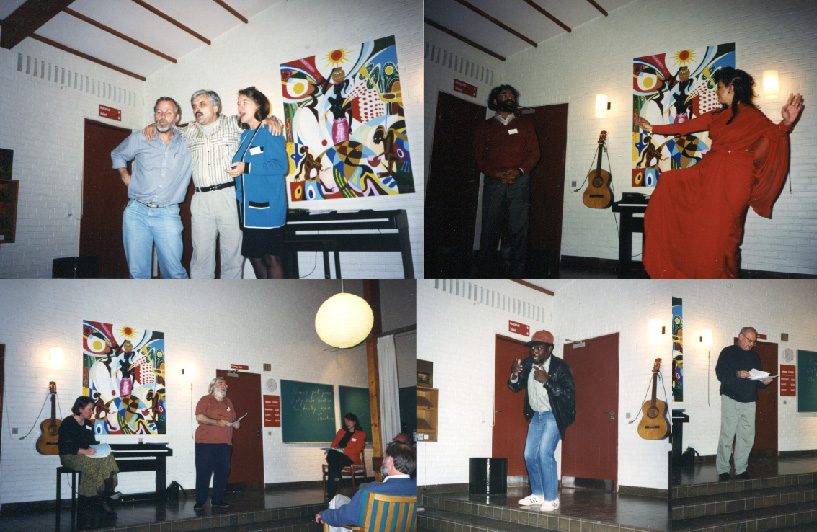
Entertainment in the evening: From the top left—Jens Lohman (Danish PEN), Alexander (Sascha) Tkachenko (Russian PEN), Joanne Leedom-Ackerman (Chair of WiPC)in a whistling song; Rajvinder Singh (German PEN, East) accompanying Archana Singh Karki (Nepal PEN) in dance; Siobhan Dowd (at piano—English & American PEN) with Moris Farhi (reading—English PEN); Sam Mbure (reciting—Kenyan PEN); Niels Barfoed (reading—Danish PEN)
During the three days, we fine-tuned our methods of working on and campaigning for our main cases, those writers who were imprisoned, attacked or threatened because of their writing, often their nonviolent voice of protest against authoritarian regimes. We considered PEN’s decision-making on borderline cases such as those which included drug charges, advocacy of violence, pornography, hate speech, terrorism. These were not categories we normally took on as cases. We discussed when we might take up such a case or assign them to investigation or judicial concern. We laid the groundwork for more joint actions among centers and other organizations such as the U.N., OSCE and IFEX, the International Freedom of Expression Exchange.

Round Table of the WiPC conference which included delegates from PEN centers in Switzerland, Jerusalem, Denmark, England, Mexico, Portugal, America, Norway, Czech Republic, Ghana, Canada, Australia (Melbourne and Sydney), Portugal, Finland, Nepal, Scotland, Malawi, Kenya, Ghana, Croatia, Slovakia, Sweden, Spain, Austria, Japan, Germany, Russia, Poland, Netherlands
With PEN’s WiPC staff Sara Whyatt and Mandy Garner, we set out a campaign calendar for the year, beginning with Turkey in May; China in June; Myanmar in July; Guatemala in September; Vietnam in October; Nigeria in November; Human Rights Day focus in December; Cuba in January; Rushdie and Fatwa and Iran in February; United Nations Commission on Human Rights lobbying in February/March and a return to China during the Chinese New Year in February/March; International Women’s Day in March and World Press Freedom Day in May. This campaign calendar meant that the London office would send information each month related to these foci, and PEN centers would plan programs if the campaign fit their work and the cases they had taken on.
We discussed the elements of successful missions to troubled areas and what future missions should be considered. In 1997 PEN International and Danish PEN sent representatives on a quiet mission to Cuba. We also strategized on the effect of writers observing trials in certain countries, particularly in Turkey.
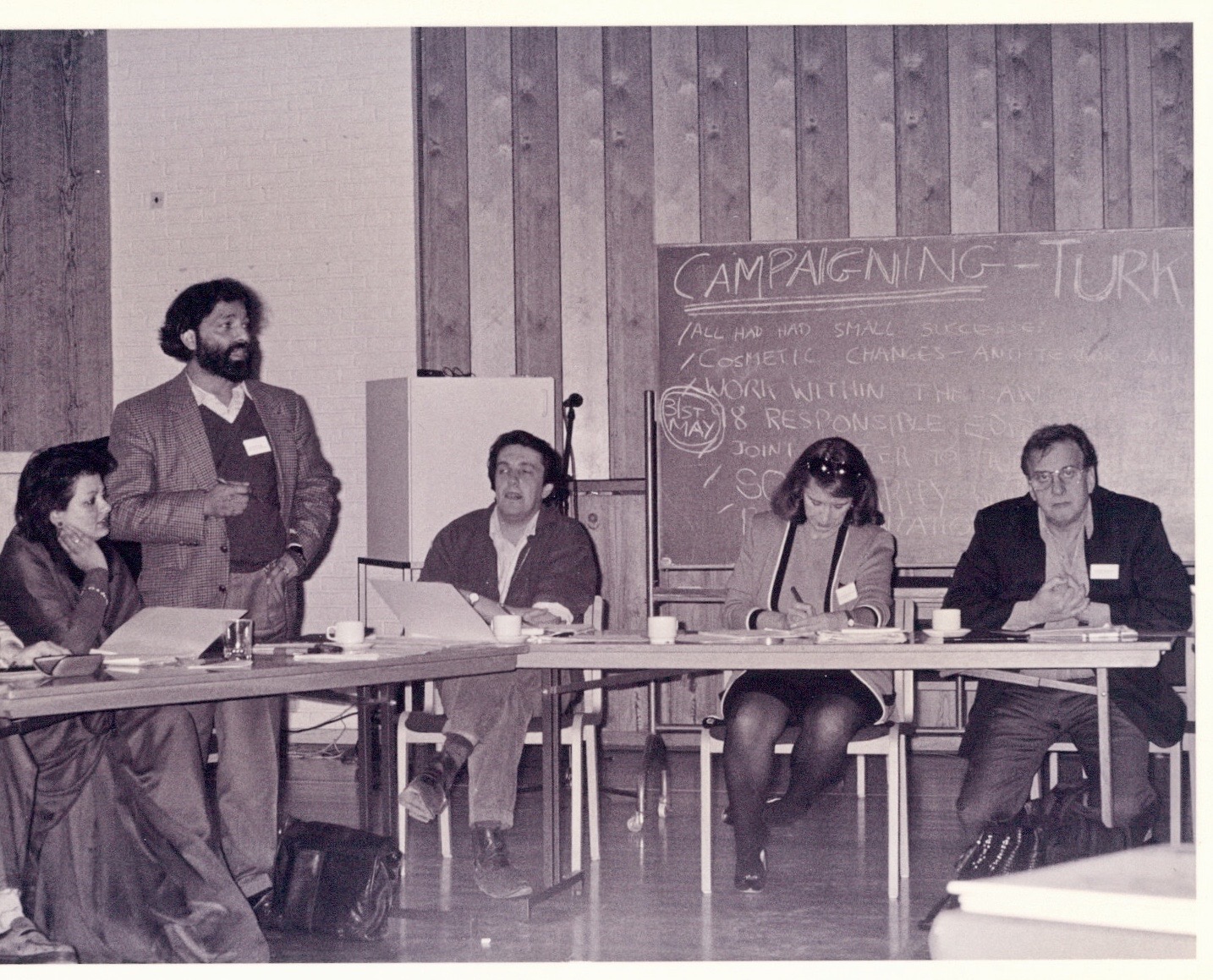
Working session on Turkey Campaign at at WiPC conference: L to R: Archana Singh Karki (Nepal PEN), Rajvinder Singh (German PEN, East), Robin Jones (WIPC staff), Joanne Leedom-Ackerman (WiPC Chair), Ronald Harwood (PEN International President)
During the conference a request came for members of PEN to sign on individually and en mass as publishers of a book in Turkey which republished an article by the famed Turkish novelist Yaşar Kemal, along with articles by other Turkish writers who were in prison because of their writing. Kemal had recently been charged because of an article he’d published in the German magazine Der Spiegel about the Kurds. The organizer in Turkey had gathered hundreds of Turkish writers, publishers, artists, and actors to sign on as publishers. They wanted to present the book and the list of hundreds of publishers to challenge the courts to bring charges against everyone. Many of us agreed to participate. This act launched a campaign in Turkey and a mission later in 1997. (Blog to come.) The independent Turkish Freedom of Expression Initiative has since gathered biennially for the last 23 years. For this kind of joint action PEN was primed to cooperate.
Finally in Helsingør the Writers in Prison Committee took a step towards opening up the election process for the WiPC Chair. My term was due to expire at the fall 1996 Congress in Guadalajara. We decided to select a nominating committee from members to find candidate(s) for the next chair rather than have the post appointed by the Secretariat in London. That process was later replicated in other elections in PEN and is standard procedure today.

Workshop: From left includes: Neils Barfoed (Danish PEN), Lady Diamond (Ghana PEN), Moris Farhi (English PEN), Sara Whyatt (WiPC Programme Director), Mandy Garner (WiPC researcher), Joanne Leedom-Ackerman (WiPC Chair at front)
Helsingør was a fitting venue for the first WiPC Conference, not only because of its literary credentials with the Kronborg Castle where most of Shakespeare’s Hamlet takes place, but also because of its historic legacy in World War II. Helsingør was one of the most important transport points for the rescue of Denmark’s Jews. A few days before Hitler had ordered that the Danish Jews were to be arrested and deported to concentration camps October 2, 1943, one of the Nazi diplomatic attaches who’d received word in advance shared the information with the Jewish community leaders. Using the name Elsinore Sewing Club, the Jewish leaders communicated with the population, and the Danes moved the Jews away from Copenhagen to Helsingør, just two miles across the straights to neutral Sweden. The Danish citizens hid their fellow Jewish citizens until they could get onto fishing boats, pleasure boats and ferry boats and escape over a period of three nights. The Danes managed to smuggle the majority of its Jewish citizens—over 7200 Jews and 680 non-Jews—across the water to safety.
Next Installment: PEN Journey 18: Picasso Club and Other Transitions in Guadalajara
PEN Journey 15: Speaking Out: Death and Life
PEN International celebrates its Centenary in 2021. I’ve been active in PEN for more than 30 years in various positions and now as an International Vice President Emeritus. With memories stirring and file drawers of documents and correspondence bulging, I am a bit of a walking archive and have been asked by PEN International to write down memories. I hope this personal PEN journey might be of interest.
As I wrote holiday cards for the prisoners on PEN’s list this year, I recalled the many cases of writers PEN has worked for over the decades—the successes when writers were released early from prison and the sorrow when they did not survive. The path back for a writer imprisoned for his work is rarely easy, at times has led to exile, but often is accompanied by a mailbag full of cards and letters from fellow writers around the world.
I also sat with PEN’s Centre to Centre newsletters spread around me from 1994-1997, the years I chaired PEN International’s Writers in Prison Committee (WiPC). During that period if a country was mentioned, I knew whether writers were imprisoned there and often knew the main cases as did PEN’s researchers. At the time we published twice a year PEN’s list with brief descriptions of the cases. Proofing paragraph after paragraph of hundreds of situations, I would know without looking when I had moved from one country to another by the punishments given. Lengthy prison terms up to 20 years to life meant I was reading cases from China, but if the writers were suddenly killed either by government or others, I’d moved on to Columbia. In Turkey were pages and pages of arbitrary detentions and investigations and writers rotating in and out of prison.
Names from this period are a kind of ghost family for me, evoking people and a time and place: Taslima Nasrin, Fikret Başkaya, Mohamed Nasheed, Gao Yu, Bao Tong, Hwang Dae-Kwon, Myrna Mack, Ma Thida, Yndamiro Restano, Mansur Rajih, Luis Grave de Peralta, Brigadier General José Gallardo Rodríguez, Koigi wa Wamwere, Eskinder Nega, Tefera Asmare, Liao Yiwu, Ferhat Tepe, Dr. Haluk Gerger, Ayşe Nur Zarakolu, Ünsal Öztürk, İsmail Beşikçi, Eşber Yağmurdereli, Mumia Abu-Jamal, Đoàn Viết Hoạt, Nguyễn Văn Thuận, Balqis Hafez Fadhil, Tong Yi, Christine Anyanwu, Tahar Djaout, Aung San Suu Kyi, Yaşar Kemal, Alexander Nikitin, Faraj Sarkohi, Ali Sa’idi Sirjani, Wei Jingsheng, Chen Ziming, Slavamir Adamovich, Bülent Balta, and many more. Many are now released, a few are even working with PEN, a number have deceased and two of the most celebrated and tragic—Liu Xiaobo and Ken Saro-Wiwa—were executed, one left to die in prison, the other hung.
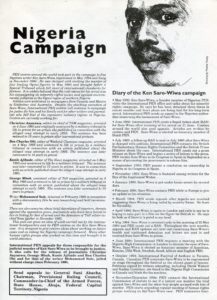
Page 1 of PEN International’s campaign for Ken Saro-Wiwa 1994-1996
In their cases, no amount of mail or faxes or later emails or personal meetings with ambassadors and diplomats changed the course for these writers. A year before Ken Saro-Wiwa’s death, noted Iranian novelist Ali Sa’idi Sirjani died in prison. And years later the murder of Anna Politkovskaya in Russia and the murder of Hrant Dink in Turkey and in 2017 the death in prison of Chinese poet and Nobel laureate Liu Xiaobo all stand out as main cases where PEN and others organized globally but were unable to change the course. I’ll address the case of Liu Xiaobo in a subsequent blog. He was also in prison during the 1990’s but was not yet the global name and force he became.
One of the most noted of PEN’s cases in the mid 1990s was Nigerian writer and activist Ken Saro-Wiwa who was hanged November 10, 1995. Ken understood they would hang him, but PEN members did not accept this. Ken was an award-winning playwright, television producer and environmental activist who took on the government of Nigerian President Sani Abacha and Shell Oil on behalf of the Ogoni people whose land was rich in oil and also in pollution and whose people received little of the profits.
I was living in London when Ken Saro-Wiwa, who had been arrested before for his writing and activism, visited PEN and other organizations in support of the Ogoni cause. PEN took no position on political causes but campaigned for his freedom to write and speak without threat. He met at length with PEN’s researcher Mandy Garner, providing her books and documentation of how he was being harassed in case he was arrested again. When he returned to Nigeria, he was arrested again and imprisoned in May 1994, along with eight others, and charged with masterminding the murder of Ogoni chiefs who were killed in a crowd at a pro-government meeting. The charge carried the death penalty.
PEN mobilized quickly and stayed in close contact with his family. Mandy worked tirelessly on the case, gathering and coordinating information and actions. Ken Saro-Wiwa was an honorary member of PEN centers in the US, England, Canada, Kenya, South Africa, Netherlands, and Sweden so these centers were particularly active, contacting their diplomats and government officials. At PEN International we met with members of the Nigeria High Commission; novelist William Boyd joined the delegation. “I remember sitting opposite all these guys in sunglasses wearing Rolex watches, spouting the government line,” Mandy recalls. We also talked with ambassadors, including from England, the US and Norway to encourage their petitioning of the Abacha government. We met with Shell Oil officials to ask that they intervene to save Ken Saro-Wiwa’s life. PEN USA West also had lengthy meetings and negotiations with Shell Oil. PEN International and English PEN set up meetings in the British Parliament where celebrated writers spoke. English PEN mounted candlelight vigils outside the Nigerian High Commission which writers including Wole Soyinka, Ben Okri, Harold Pinter, Margaret Drabble and International PEN President Ronald Harwood attended. A theater event in London featured Nigerian actors acting out extracts from Ken’s plays and also reading poems from other writers in prison. Taslima Nasreen spoke as well. Ken’s writing was made available to the press which covered the story widely.
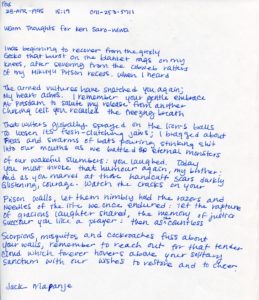
Poem from Malawian poet Jack Mapanje to Ken Saro-Wiwa published on page 2 of PEN Campaign document above
The activity in London mirrored activity at PEN’s more than 100 centers around the globe, from New Zealand to Norway, from Malawi to Mexico. From every continent signed petitions were faxed to the Nigerian government of General Sani Abacha and to the writers’ own governments, to members of Commonwealth nations, to the European Union, the United Nations and to the press calling for clemency for Ken Saro-Wiwa. Through the International Freedom of Expression Exchange (IFEX) of which PEN International was a founding member, the word spread to freedom of expression organizations worldwide. Other human rights organizations including Amnesty and Greenpeace also protested. No one wanted to believe in the face of such an international outcry that the generals in Nigeria, particularly Nigeria’s President Sani Abacha, would kill Ken Saro-Wiwa.
Ken managed to get word out that he was tortured and held in leg irons for long periods of time. He wrote to Mandy, “A year is gone since I was rudely roused from my bed and clamped into detention. Sixty-five days in chains, many weeks of starvation, months of mental torture and, recently, the rides in steaming, airless Black Maria to appear before a Kangaroo court, dubbed a Special Military Tribunal where the proceedings leave no doubt at all that the judgement has been written in advance. And a sentence of death against which there is no appeal is a certainty.”
I moved from London to Washington, DC in late August 1995. When the death sentence was handed down at the end of October, PEN International launched a petition signed by hundreds of writers from around the globe seeking Saro-Wiwa’s and others’ release. For days I tried to get an appointment with the Nigerian Ambassador in Washington. Finally one morning I received a call that I had been given an appointment; however, I was in New York City that morning. Quickly I got a flight back to Washington. En route I called the former PEN WiPC director Siobhan Dowd, who was then heading the Freedom to Write program at American PEN. I asked her to arrange for a second writer to meet me at the Nigerian Embassy. The person didn’t have to say anything, but I wanted a larger delegation.
When I arrived, I was informed the Ambassador had suddenly been called to the U.N. in New York so I met with the number two and three ministers. As I began setting out PEN’s case on behalf of Saro-Wiwa, another woman slipped into the room and sat without speaking but lending ballast to the meeting. Afterwards she and I had coffee, and I briefed her on the case. For the next 25 years Susan Shreve, one of the founders of the PEN Faulkner Foundation, and I have been friends, a friendship that grew out of this tragic event. A few days later I was standing outside the Nigerian Embassy in a vigil, along with representatives from Amnesty and other organizations, when word was sent out to us that Ken Saro-Wiwa had been hanged that morning in Port Harcourt.
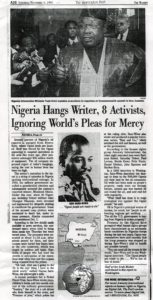
Article from The Washington Post November 11, 1995
The effect of his execution raced through the PEN network and through the human rights and political communities worldwide. The grief was communal. Those who worked on Ken’s case can relate to this day where they were when they heard the news of the execution. The shock was also political. Boycotts were launched against Nigeria. Archbishop Desmond Tutu appeared at a benefit in London for Ken Saro-Wiwa and reported outrage in South Africa over the executions of Saro-Wiwa and the others. He said South African President Nelson Mandela was heading up a campaign to urge the world, especially the US and Western governments to take action. Nigeria was suspended from the British Commonwealth for three years.
Ken’s brother quickly left Nigeria and went to London for a period, sheltering temporarily with British novelist Doris Lessing then relocated in Canada for a time. Ken Saro-Wiwa’s son, Ken Saro-Wiwa Jr., a journalist, also settled in Canada, then in London, then returned and worked for a period in the Nigerian government of Goodluck Jonathan as a special assistant on civil society and international media. He died suddenly in London at age 47 in 2016.
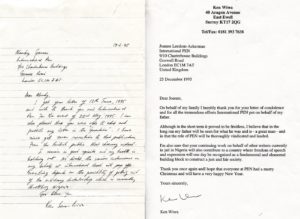
Letter on left from Ken Saro-Wiwa to PEN researcher Mandy Garner. Letter on right from Ken Saro-Wiwa, Jr. to WiPC Chair Joanne Leedom-Ackerman.
The killing of Ken Saro-Wiwa was the beginning of the end for General Sani Abacha, who maneuvered to be the sole presidential candidate in Nigeria’s next election, but died in June, 1998 when he suddenly got ill early one morning and died within two hours, at age 54, the same age as Ken Saro-Wiwa when he was hanged. There were persistent rumors that Abacha had been poisoned, but there was no autopsy and these rumors were never proven.
According to news reports in Lagos, it took five attempts to hang Ken Saro-Wiwa. He was buried by security forces, denying his family the right to bury him. His last words were reported to be: “Lord, take my soul, but the struggle continues.”
Releases of writers PEN worked for that year included Cuban poet Yndamiro Restano freed after serving three years of a ten-year sentence, Cuban journalist Pablo Reyes Martinez freed after three years on an eight-year sentence, Turkish writer Fikret Baskaya freed early and also Unsal Ozturk, freed eight years early, Chinese writer Yang Zhou freed after serving one year of a three-year sentence and Wang Juntao freed after serving five years of a 13-year sentence, Burmese Zargana freed a year early and many others.
“I wish to thank International PEN and the WiPC for all their endeavors on my behalf during the period of my detention. There is no doubt in my mind at all that the powerful insistence and impartial voice of PEN did a lot to win me my freedom from the tyrannical arms of the military dictatorship in Nigeria…”—Ken Saro-Wiwa in fall, 1993 after his earlier detention.
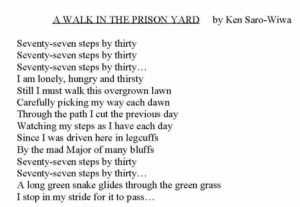
From Ken Saro-Wiwa’s poem “A Walk in the Prison Yard”
Next Installment: PEN Journey 16: The Universal, the Relative and the Changing PEN
PEN Journey 11: Death and Its Threat: the Ultimate Censor
PEN International celebrates its Centenary in 2021. I’ve been active in PEN for more than 30 years in various positions and now as an International Vice President Emeritus. With memories stirring and file drawers of documents and correspondence bulging, I am a bit of a walking archive and have been asked by PEN International to write down memories. I hope this personal PEN journey might be of interest.
In Bangladesh novelist Taslima Nasrin was in hiding. Death threats had been issued, a price put on her life. On the streets of Dhaka and other cities, crowds threatened to hang her because of her words in a newspaper challenging the Koran and Islamic laws and because of her novel Lajja (Shame) which depicted Muslim atrocities on Hindus after a mosque’s destruction in Ayodhya, India.
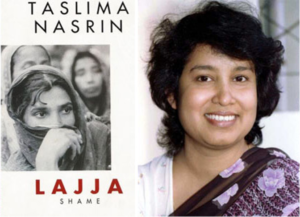
The time was summer, 1994. In London Sara Whyatt, PEN’s Writers in Prison Committee Coordinator, and I sat in a Kensington hotel restaurant waiting to meet a man who’d called the office and said he was Taslima’s brother and wanted to talk with us. PEN had been actively working on Taslima’s case for the past year, sending out Rapid Action Alerts, meeting with Bangladeshi government officials in London and in the U.S. and Europe, calling on the government to protect her. The case had gained international attention. Given recent violence around fatwas, including those on Salman Rushdie, we were wary. We didn’t know Taslima had a brother. We spoke with MI5 who advised us to have a spotter for the meeting. We arranged a tell so that if the encounter was not legitimate or we perceived trouble, I would take my sunglasses from the top of my head and set them on the table. The spotter—PEN’s bookkeeper—sat at another table and could quickly summon help. We weren’t certain, but we thought MI5 was also in the hotel.
In retrospect the drama around Taslima’s case seems inflated, but during that period of 1993-1994 the situation had escalated to the point that religious leaders were warning that the government would be overthrown if Nasrin was not arrested. In June, 1994 when an arrest warrant was issued, Taslima went into hiding. A nationwide hunt was launched, and snake charmers carrying poisonous snakes marched in Dhaka and warned that thousands of snakes would be let loose if Nasrin was not arrested by June 30.
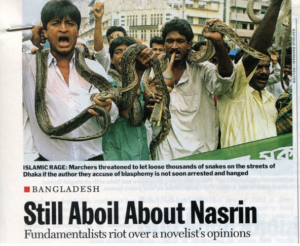
Time, July 11, 1994. Photo by Rafique Rahman-Reuters
In this atmosphere PEN had received the call from Taslima’s older brother. International PEN’s Writers in Prison Committee and PEN’s Women’s Committee, in particular its chair Meredith Tax in New York, had been in touch with Taslima and her lawyers, but in the time of faxes, (now fading), inconsistent telephone connections, and no internet between writers, no one had yet confirmed a brother coming through London. This kind of high drama was not PEN’s usual modus operandi. In the years I chaired PEN’s Writers in Prison Committee (1993-1997), more than 900 writers threatened, detained, in prison, and killed came across PEN’s desk annually. Approximately a quarter of these were designated main cases which meant PEN had sufficient information to verify the situations and had members to work on the writer’s behalf. However, only a few became global causes like Taslima’s, gathering energy, attention and advocates around the world. This usually happened when the threat of death was credible and immanent and when the circumstances of the writer connected to larger issues.
That day in London, a man in his thirties approached our table. He looked so much like pictures of Taslima that we quickly set aside our suspicions. He worked for an airline and was passing through London. He was able to answer questions and confirm details of the case such as what Taslima had actually said to the newspaper which had misquoted her calling for revision of the Koran. I still have my notes from that meeting. Her brother explained that Taslima had said she wanted to modify Sharia laws, not the Koran. “I want men and women to be equal,” she’d said. She was charged with blasphemy under a law left on the books by the British.
Her brother told us that her lawyer was afraid. The lawyer couldn’t move for bail unless Taslima was present, but if the government didn’t give security for her, they couldn’t take the risk of Taslima coming to court. The government said if Nasrin went to court, anything could happen in court or in jail. In jail she could be killed. Her father’s home had been attacked, and he was now under protection.
Her brother confirmed that Taslima had finally agreed that she needed to leave Bangladesh though she was reluctant. “If I go from Bangladesh, who can write about these poor women?” she asked. And yet she wasn’t able to write anything now, he said, and her life was not safe if she stayed.
Her trial date had been set for Aug. 4. If she didn’t appear, the government would seize her things, including her passport, which they had taken away before but had returned when she resigned her post as a doctor. She was a medical doctor as well as writer.
Her brother’s message to us that day was: “Save my sister!”
Through discussions with her lawyer, with selected PEN members and with the Bangladeshi courts, it was finally arranged that Taslima would turn herself in late in the evening. Bail would be set and met, and in disguise she would leave the court. The president of Swedish PEN flew to Dhaka and accompanied her in a flight to Sweden, where she lived for years in exile.
It was lonely in exile. I met with Taslima in early September 1994, a few weeks after her arrival in Stockholm. I have notes from those meetings. “One day I’ll go back,” she said, “but I don’t know if I could live in my country anymore. I don’t know what will happen. I want to live in Bengal, but they will kill me. I couldn’t take my writing out.”
She explained that she was from a Muslim family with Hindus as her neighbors. “From the beginning I went to their houses, played with them. I know their culture, attitudes. I know their happiness and sorrow from childhood. It is not difficult for me to reach them.” After the violent incidents in Ayodhya, India where Hindu women were raped and their homes looted, she said, “I felt them. I have felt the danger and had to write for them…Why can’t I write a book in reverse, but they feel they should write my book in the case like Lajja…In India, Hindus can’t feel Muslim, and Muslims can’t feel Hindu…In Bengal, Hindu and Muslim live separately…People think men are superior to women. Women always get advice from men. Mothers are always kept quiet. It is not allowed for a mother to give advice to a son.”
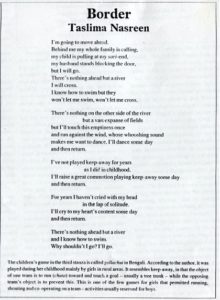
London Review of Books, September 8, 1994
At the time and in retrospect at PEN we questioned whether any of our actions escalated the situation for Taslima’s case. This was the Bangladeshi government’s argument, but Amnesty and numerous human rights and freedom of expression organizations also highlighted her situation. Through IFEX, the International Freedom of Expression Exchange of which PEN was a founding member, reports circulated worldwide. The fact was, Taslima Nasrin was in real danger. PEN went into action and helped with her extraction.
In November 1994 Taslima was a special guest at the 61st PEN International Congress in Prague, opened by Vaclav Havel as the keynote speaker. In December that year she received the prestigious Sakharov Prize for Freedom of Thought, given by the European Parliament.
Though Taslima’s case was the most celebrated at the time, there were numbers of other writers and women under threat because of their writing. In a town in Northern Greece Anastasia Karakasidou had received anonymous letters threatening to rape and kill her in front of her children because of her scholarly dissertation on the ethnic Slav population in that region. In Algeria another woman writer stayed in her house afraid even to go out on the street because her words challenged both government and fundamentalists’ violent policies. She had not received a direct death threat, but she was a well-known and recognized writer in a country where more writers had been killed in that past year than in almost any other, including Somalia, Angola and the former Yugoslavia.
Death was the ultimate censor, and the threat of death was its chilling companion. International PEN’s Writers in Prison casebook at the time listed at least 22 countries where writers were under death threats. In four countries the writers had gone into hiding. Death threats also prompted self-censorship for many writers. Most of the threats did not come directly from governments but from individuals who professed to be offended by the writer’s words. The offense, however, was almost always tied to a political or religious position, and the writer’s life became a political, not a moral, consideration.
While issues of communal violence and religious and political Islam differed from the rights of ethnic minorities in Northern Greece or from political probity in Argentina, Guatemala, Peru, Paraguay where PEN listed high numbers of death threats, the common need in all these cases was for the government to protect the writers and take action against those who issued the threats.
Next Installment: PEN Journey 12: Tolerance on the Horizon?